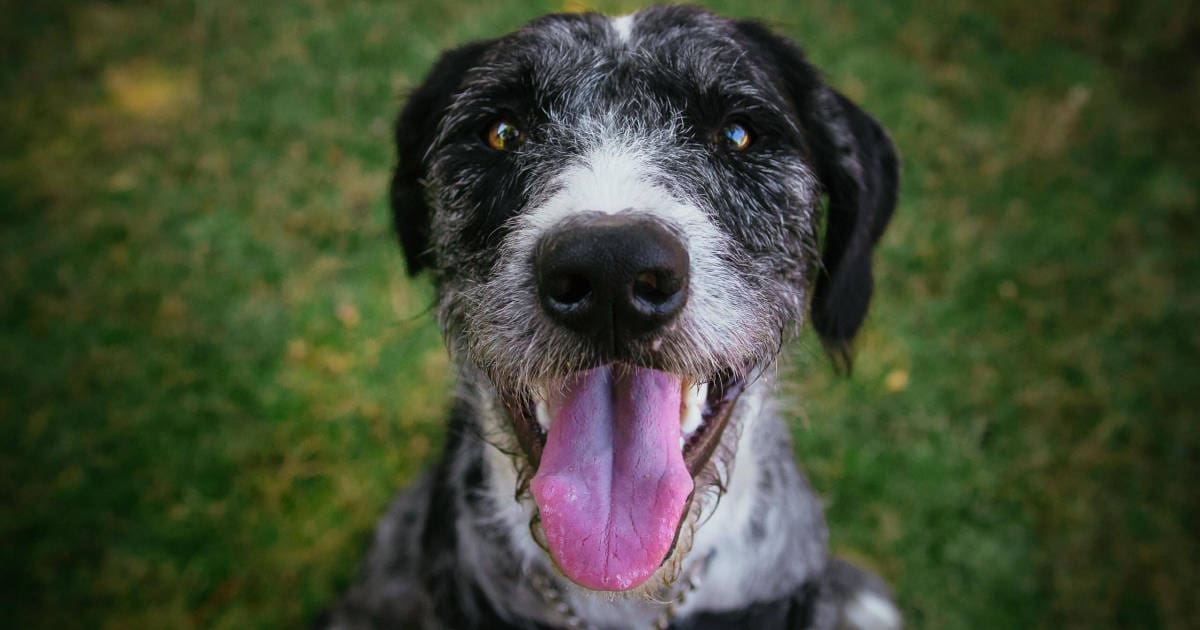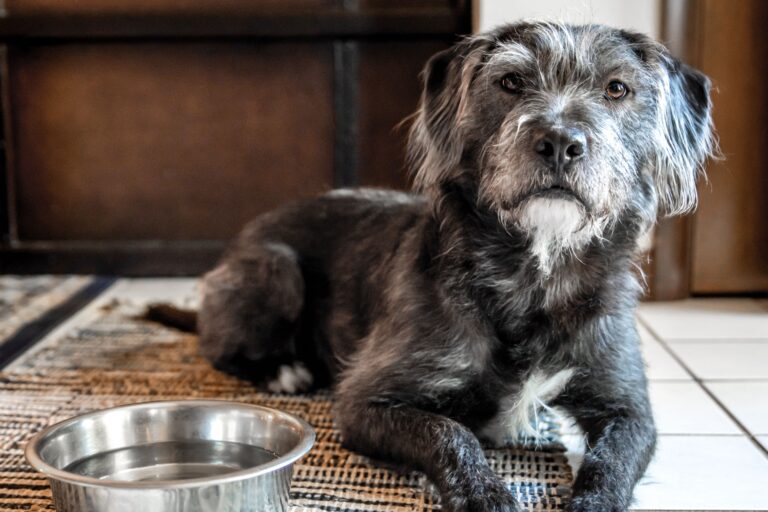If your senior dog is panting at night and drinking lots of water, it could be a sign of a medical condition that needs attention. Some common causes of increased thirst in older dogs include kidney failure, diabetes mellitus, Cushing’s disease, or dehydration.
It is important to consult with a veterinarian to determine the underlying cause and appropriate treatment for your dog.

Credit: www.texvetpets.org
Causes Of Senior Dog Panting And Excessive Thirst
Senior dogs are prone to various health issues that can cause them to pant excessively and drink a lot of water. It is important to identify the underlying causes of these symptoms in order to ensure proper care and treatment for your furry friend. Some common reasons for senior dogs experiencing panting and excessive thirst include:
Medical Conditions
There are several medical conditions that can contribute to senior dogs panting and drinking excessive amounts of water. These conditions may include:
- Kidney Failure: Kidney failure is a common condition in senior dogs that can lead to increased thirst and panting. It occurs when the kidneys are no longer able to function properly, causing a build-up of toxins in the body.
- Diabetes Mellitus: Diabetes mellitus is another condition that can cause excessive thirst and panting in senior dogs. It occurs when the body is unable to regulate blood sugar levels, leading to increased water intake and frequent urination.
- Cushing’s Disease: Cushing’s disease is a hormonal disorder that can affect senior dogs. It results in the overproduction of cortisol, which can lead to increased thirst and panting.
Chronic Illnesses
Chronic illnesses are another potential cause of excessive panting and thirst in senior dogs. These illnesses may include:
- Osteoarthritis: Osteoarthritis is a common condition in older dogs that can cause pain and discomfort. This discomfort can lead to increased panting, especially at night when there are fewer distractions.
- Dental Disease: Dental disease can cause pain and discomfort in senior dogs, leading to increased panting. It is important to maintain good dental hygiene to prevent dental disease in older dogs.
Dehydration
Dehydration can also contribute to senior dogs panting excessively and drinking lots of water. Dehydration can occur due to various reasons, including:
- Heat: Exposure to heat can cause dogs to become dehydrated quickly, leading to excessive panting and increased water intake.
- Exercise: Vigorous exercise can also result in dehydration, causing senior dogs to pant excessively and seek more water.
- Illness: When senior dogs are sick, they may experience dehydration, which can result in increased panting and a need for more water intake.
If you notice your senior dog panting excessively and drinking lots of water, it is important to consult with your veterinarian to determine the underlying cause and provide the appropriate treatment. Regular veterinary check-ups and proper care can help manage these symptoms and ensure your senior dog stays comfortable and healthy.
Signs And Symptoms Of Senior Dog Panting At Night
Senior dogs may pant at night and drink lots of water due to various reasons such as kidney failure, diabetes, Cushing’s disease, or dehydration. If your senior dog exhibits these signs, it is important to consult a vet for proper diagnosis and treatment.
Pain And Mobility Issues
Senior dogs often experience pain and mobility issues as they age. Conditions such as osteoarthritis, dental disease, and chronic illnesses can lead to discomfort, making them more prone to panting at night. Pain can be exacerbated when they lie down, causing them to have trouble finding a comfortable position. As a result, they may pant more frequently during the night when there are fewer distractions to take their mind off their discomfort.Quality Of Sleep
One of the reasons senior dogs pant at night is the impact it has on their quality of sleep. Just like humans, dogs need restful sleep to recharge and rejuvenate. However, pain or discomfort can disrupt their sleep patterns, causing them to wake up frequently during the night. This interrupted sleep can lead to excessive panting as their bodies struggle to regulate their temperature and find relief from their discomfort.Anxiety And Dementia
Anxiety and dementia are common issues experienced by senior dogs. Anxiety can arise from various causes such as separation anxiety or changes in their environment. Dogs with dementia may exhibit confusion, disorientation, and restlessness, leading to increased panting at night. These conditions can heighten their overall stress levels, resulting in excessive panting as their bodies try to cope with the emotional and cognitive challenges they face. In conclusion, there are several signs and symptoms of senior dog panting at night. Pain and mobility issues, the quality of sleep, and anxiety and dementia all play a role in why senior dogs may pant more frequently during the night. If you notice your senior dog exhibiting any of these signs, it is important to consult with your veterinarian to ensure their well-being and address any underlying health concerns.Management And Treatment Of Senior Dog Panting And Excessive Thirst
Excessive panting and excessive thirst in senior dogs, especially at night, may indicate underlying health issues such as kidney failure, diabetes, or dehydration. If you notice these symptoms, it is important to consult with a veterinarian for proper management and treatment.
Veterinary Care
If you notice your senior dog is panting excessively at night and drinking a lot of water, it’s important to seek veterinary care. Schedule a visit to the vet as soon as possible to determine the underlying cause of these symptoms. Common causes can include kidney failure, diabetes mellitus, Cushing’s disease, or dehydration, which all require proper diagnosis and treatment.
Hydration Strategies
Maintaining proper hydration is essential for your senior dog’s overall health. Provide fresh, clean water at all times and ensure it is easily accessible. Consider using a water fountain or multiple water bowls placed throughout the house to encourage your dog to drink more water. Monitoring water intake is important, especially if excessive thirst is a concern. Make note of how much water your dog is drinking per day and discuss it with your vet during your visit.
Medication And Therapy
Depending on the diagnosis from your vet, medication and therapy may be prescribed to manage your senior dog’s panting and excessive thirst. For example, if diabetes is the cause, insulin therapy or oral medications might be recommended. If kidney disease is the underlying issue, a special diet along with medication to support kidney function may be necessary. Always follow your vet’s recommendations and administer any prescribed medications as instructed.
Additionally, maintaining a comfortable environment for your senior dog is important, especially at night. Ensure your dog has a cozy bed, proper bedding, and a quiet, low-stress sleeping area. Regular exercise during the day can also help alleviate panting and promote better sleep at night. However, it’s essential to consult with your vet before starting any exercise program, as certain health conditions may require modifications to exercise routines.
In conclusion, senior dog panting and excessive thirst can be concerning but can often be managed with proper veterinary care, hydration strategies, medication, and therapy. Remember to consult with your vet for an accurate diagnosis and appropriate treatment plan for your beloved senior dog.

Credit: news.orvis.com

Credit: toegrips.com
Frequently Asked Questions For Senior Dog Panting At Night And Drinking Lots Of Water
Why Is My Old Dog Panting And Drinking A Lot Of Water?
Old dogs may pant and drink a lot of water due to kidney failure, diabetes, Cushing’s disease, or dehydration. It is important to consult a vet if your senior dog shows these symptoms.
What Does It Mean When An Older Dog Starts Drinking A Lot Of Water At Night?
When an older dog starts drinking a lot of water at night, it could indicate medical conditions like kidney failure, diabetes, or dehydration. It is important to schedule a visit to the vet if you notice this behavior in your senior dog.
Why Does My 14 Year Old Dog Pant At Night?
Older dogs can pant at night due to various reasons, such as pain, discomfort, or underlying health issues like heart or respiratory disease. It is important to consult a veterinarian to determine the exact cause and provide appropriate treatment.
Why Is My Dog Panting So Much Excessive Drinking?
Excessive panting and drinking in dogs may be caused by dehydration, heat, exercise, or illness. Medical conditions such as kidney failure, diabetes, or Cushing’s disease may also lead to increased thirst. It is important to consult a veterinarian if you notice these symptoms in your senior dog.
Conclusion
If you notice your senior dog panting at night and drinking lots of water, it could be a sign of an underlying health issue. Some common causes include kidney failure, diabetes, Cushing’s disease, or dehydration. It’s important to address these issues promptly by visiting your vet.
Increased water intake can indicate a medical condition that needs treatment. Keep an eye on your furry friend’s behavior and consult a professional if you have any concerns about their well-being.



